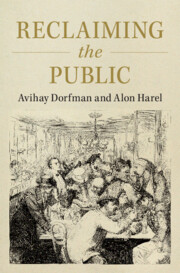Book contents
- Reclaiming the Public
- Reclaiming the Public
- Copyright page
- Dedication
- Contents
- Acknowledgments
- Introduction
- 1 A Public Conception of Political Authority
- 2 Law as Standing
- 3 Speaking in a Different Voice
- 4 Inherently Public Goods
- 5 Against Privatization as Such
- 6 Public Ownership
- 7 Why Not Artificial Intelligence?
- Concluding Remarks
- Index
1 - A Public Conception of Political Authority
Published online by Cambridge University Press: 22 February 2024
- Reclaiming the Public
- Reclaiming the Public
- Copyright page
- Dedication
- Contents
- Acknowledgments
- Introduction
- 1 A Public Conception of Political Authority
- 2 Law as Standing
- 3 Speaking in a Different Voice
- 4 Inherently Public Goods
- 5 Against Privatization as Such
- 6 Public Ownership
- 7 Why Not Artificial Intelligence?
- Concluding Remarks
- Index
Summary
Political authority can be tyrannical even when the laws it creates are grounded in reason, the authority enjoys the consent of the governed, and its lawmaking procedures are egalitarian and fair. To provide a more appealing account of political authority, we argue that a certain conception of the public provides the basis for explaining what political authority is and what might render it legitimate. An institution or official has legitimate authority when it speaks and acts “in our name,” rather than “for us.” This implies that its rules can be characterized as “our rules” and, consequently, that we are responsible for these rules. To count as ours, these rules should satisfy the condition of perspectivism. The rules must reflect the perspective of citizens. Perspective is an abstract concept that can take different interpretations, some of which we describe in this chapter. When this condition is met, the authority’s decisions are attributable to the citizens, rendering them responsible for these decisions.
Keywords
- Type
- Chapter
- Information
- Reclaiming the Public , pp. 14 - 40Publisher: Cambridge University PressPrint publication year: 2024



